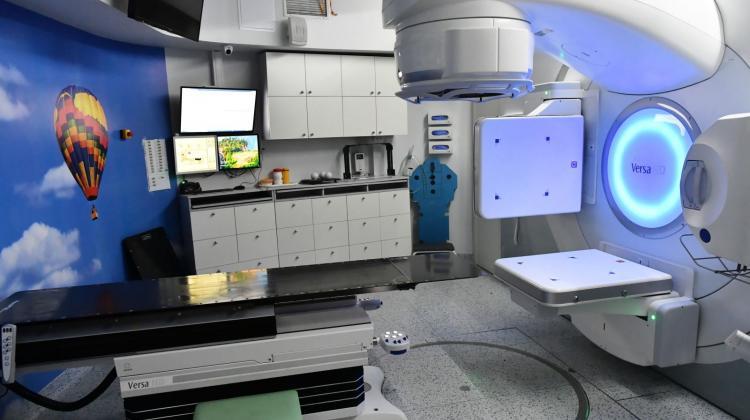Researchers are working on a test to predict complications after radiotherapy
 Photo: Fotolia
Photo: Fotolia
Scientists from Łódź are working on a universal test for predicting complications after radiotherapy in cancer treatment. The test will be based on biological indicators that show how the patient\'s cells respond to the dose of radiation. They will allow to personalize radiotherapy and reduce side effects.
One of the main trends in oncology today is research on biomarkers that allow to diagnose early stages of cancer, predict response to treatment or probability of survival.
"What we want to do in the project is to find biomarkers that can be measured in serum to optimise the dose of radiation so as not to generate additional side effects while destroying cancer cells to allow patients to live as long as possible" told - PAP Beata Małachowska from the Department of Biostatistics and Translational Medicine of the Medical University of Lodz.
The biomarkers studied by the team are molecules called microRNAs, or short ribonucleic acid fragments present in the blood. "We would like to find those that allow to estimate whether the dose the patient received in the first wave of radiotherapy was not too high, how the patient responds to radiotherapy, and whether it is possible to personalize such radiotherapy based on the measurement of serum microRNA" - explained Małachowska.
Oncological treatment is based mainly on the use of chemotherapy, surgery and radiotherapy, which involves destroying of cancer cells with ionising radiation. This is a very effective and common treatment method that is used in about half of cancer patients worldwide.
"Radiotherapy is one of the three pillars of cancer treatment and it can often extend the lives of patients. Unfortunately, in many cases, it also causes serious complications that can even lead to death due to the fact that a too high dose was given and various complications developed. Such side effects of radiation therapy are due to the fact that ionising radiation reaches not only the cancer cells, but also the healthy tissues surrounding the tumour" - emphasised Beata Małachowska.
Radiotoxicity to healthy tissue in the vicinity of the tumour region is currently the main factor limiting the effectiveness of treatment. Predicting the risk of radiotoxicity in a patient before or during treatment is not possible yet.
The project of Łódź scientists aims to produce and assess the clinical effectiveness of a new class of radiotoxicity biomarkers - microRNAs, allowing for the rapid and effective evaluation of therapy toxicity at a given moment.
"We are currently using biomarkers in peripheral blood to identify patients at high risk for radiotherapy complications. We hope that with their help we will be able to predict that a patient will need some modification in radiotherapy to get the full radiation dose but delivered in a personalized manner, safest for the patient" - said PAP, head of the Department of Biostatistics and Translational Medicine of the Medical University of Lodz, Prof. Wojciech Fendler.
As a model disease, patients with head and neck tumours have been selected - a group where severe early complications during radiotherapy result in discontinuation or prolongation of radiotherapy in over 60% patients. Radiotherapy of this area is characterized by extremely narrow therapeutic index, which means that the increased chance of killing all cancer cells is accompanied by a significant increase in the risk of developing serious complications.
This also reduces the survival chances of patients, and the occurrence of so-called acute and late radiation reactions drastically reduces the quality of life of patients.
The innovativeness of the project of Łódź researchers consists in the personalization of therapy. Their statistical model is designed to allow individually assess the risk of reaction in patients, so that the treatment plan can be adjusted to minimize the risk of complications by early symptomatic treatment or the use of radioprotective drugs. This individual risk of radiotherapy complications will be the basis for the preparation of a diagnostic test and patenting it.
"In this therapeutic project we intend to create a simple and easy to use test that till tell that after the first dose of radiation the patient it at high risk of complications and should either receive medications that alleviate the risk of complications, or have the treatment plan modified to complete the therapy with minimal risk of discontinuation due to systemic complications related to radiation" - emphasised Prof. Fendler.
In addition, basic research is being carried out in the project to develop a platform for integrating knowledge about biomarkers present in the blood. The platform will not be limited to biomarkers used in oncology - it will allow to consolidate useful data in all areas of medicine.
The project "Predictive biomarkers of radiotoxicity (PBRTox)" is due to end in spring 2020. It is financed by the Foundation for Polish Science with the European Union funds under the Intelligent Development programme.
PAP - Science and Scholarship in Poland
szu/ zan/ kap/
tr. RL
Przed dodaniem komentarza prosimy o zapoznanie z Regulaminem forum serwisu Nauka w Polsce.


















